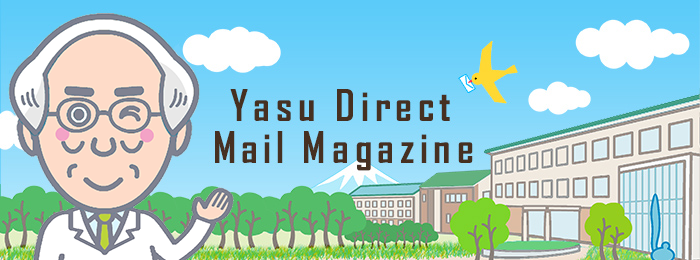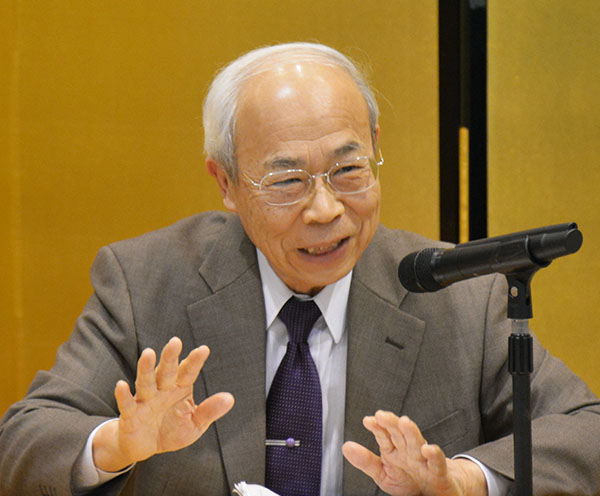No. 3 (January 15, 2015)


Yasu Direct Mail Magazine No. 3 (January 15, 2015)
Happy New Year to all students of SOKENDAI
National universities are currently in the middle of the three-year University Reformation Acceleration Period, and we will enter its final fiscal year in April 2015. The national government -amidst difficulties such as the severe financial circumstances, decreasing birthrate and aging population, and the rise of emerging nations amidst globalization- believes that innovation via science is the source of national power in Japan, a country with scarce natural resources.
To that end, strong expectations are directed at universities for the development of human resources that are innovative enough to solve new problems. Meanwhile, former Gifu University President Toshio Kuroki in JSPS Research Center for Science Systems points out in his book Struggles of a Parachute University President that more Nobel Prize-winning research has been carried out by one person on topics that no one recognizes as important (which led to the discovery of its importance afterwards), rather than research that resolved a problem everyone viewed as important. Namely, in academics the discovery of new problems via foundational research is indispensable.
This enhances human culture, enriches the hearts of people, and at times leads to innovation in Industry and the lives of people. Based on this point, starting in FY2015 SOKENDAI has set forth "Researchers who can discover new issues and solve new problems and are possessed of outstanding expertise and broad perspectives" as its new ideal human resource development vision to be aimed at by the university,a presupposition in educational reform.
To cultivate human resources of this type, the university must carry out synthetic liberal arts education and professional basic education as the educational programs throughout the entire school. As an example of the former, we are planning to offer the Freshman Course, a training camp-type synthetic liberal arts education program for all new students.
As an example of the latter, we are planning to offer the Hayama Course (tentative name), a training camp-type professional basic education program for students in five-year courses (mainly all students in thei second year). We warmly welcome students other than new students and second-year students in five-year courses, too, to participate in these programs. Both of these will be training camps that last for several days.
The significance of conducting these training camps is allowing students to learn together in a concentrated way. In addition, students who often are separated at different campuses and laboratories with small numbers of people will be gathered together and engage in close communication, which is significant in terms of making friends and people to consult with. To discover new issues and solve new problems, different ways of thinking will be required than those of the past. Therefore, students must learn about scholarship and studies spanning more than one specialized field. Accordingly, our faculty members are now making effort to create programs so that all participants in the Hayama Course (tentative name) will be able to gain a four-dimensional understanding of two or more fields including temporal axes.
I believe that participants will be able to make friends from other fields via the training camps, and am Sure that these connections will be precious assets after students have become researchers in the future.
As I mentioned previously, scholarship creates many individual values; it enhances human culture and enriches the hearts of people. It also produces social and public value by leading to the improvement of human life and industry. It enhances brain activities (which comprise roughly 20% of the body's total energy at rest) and is useful for maintaining physical health.
The act of thinking about something you are interested in alsoimproves the quality of everyday life.
Moreover, I, as a medical doctor, must point out that continuing these activities can help prevent the onset of senile cognitive impairment in the future (Note 1).
I expect that students will make diligent efforts in their daily studies and research with the aim of becoming researchers who can discover new issues and solve new problems.
Until next time!
Supplement 1) In the previous issue I wrote about the importance of publishing research results as papers and books, and stated the necessity of including the name "SOKENDAI". Here, I would like to inform you that the English name of the university has been changed.
Up until now we used "The Graduate University for Advanced Studies (SOKENDAI)", but from now on "SOKENDAI (The Graduate University for Advanced Studies)", the opposite order, will be used. In some cases, "SOKENDAI" may be used by itself.
Supplement 2) We will create a list of papers and books (either in English or Japanese) authored and published by SOKENDAI students during the year 2014. This information will be included in the SOKENDAI Annual Report.
You should receive a request to provide this information soon, so I kindly ask for your cooperation at that time.
Also, please take advantage of the Center for the Promotion of Integrated Sciences' paper publication expense subsidy system, which provides up to 100,000 yen of the publication expense for papers authored by SOKENDAI students that clearly state "SOKENDAI" as their affiliation.
Note 1) Besides intellectual activity, no smoking, personal contact and communication, and improved life-style (especially concerning diet, exercise and sleep) are helpful to protect from senile cognitive impairment.
